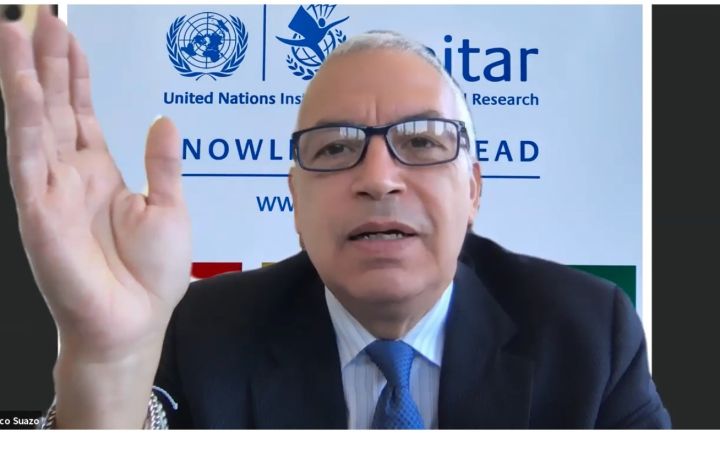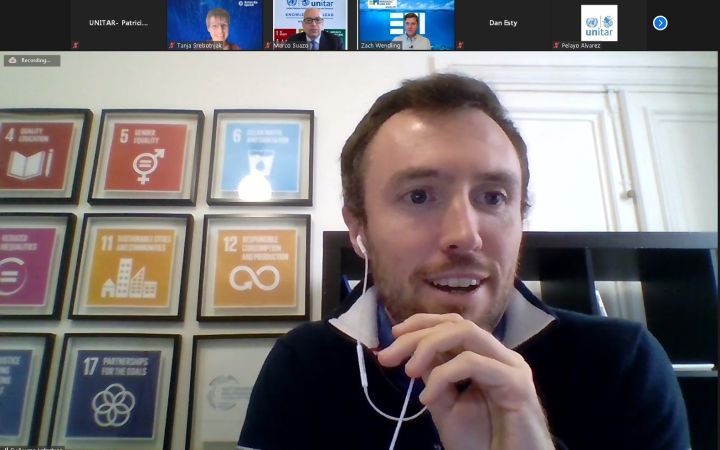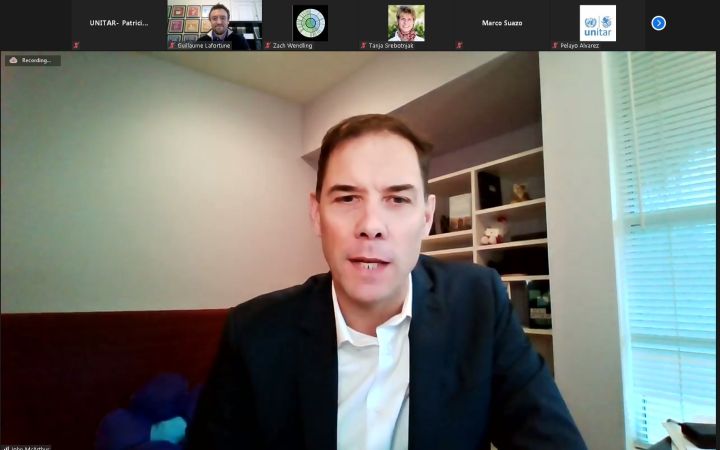19 October 2020, New York, USA. – In parallel with the environmental objectives set forth by the United Nations as it celebrates its historic 75th Anniversary, the United Nations Institute for Training and Research (UNITAR) New York Office and the Yale Center for Environmental Law & Policy hosted a training workshop for UN delegates and interested participants, entitled “Achieving Sustainability Through Metrics” on 15 October 2020. As with the other workshops, this session took place in an online format attracting over 60 participants from all over the world.
Mr. Daniel C. Esty, Director of Yale Center for Environmental Law & Policy, opened the webinar with a warm welcome to participants and expressed his gratitude to the panelists to speak on the topic of metrics and their importance to international sustainability goals. After a brief introduction of the webinar, he passed the floor to the Executive Director of UNITAR, Mr. Nikhil Seth, who joined the session from Geneva, Switzerland, to provide opening remarks at the event.
Mr. Seth gave a detailed presentation to the participants on his perspective of the importance of the global environment and common things humanity shares, as he described the function of UNITAR dedicated to developing Members States’ capacities, enhancing the quality of global decision-making processes, and supporting country-level actions for shaping a better future. Mr. Seth included important information for participants on UNITAR’s commitments to the implementation of the Sustainable Development Goals (SDGs), and most importantly, as an educational institution, UNITAR constant increase in its own capacities and incorporates innovative technologies into its agenda.
The primary focus of the Executive Director of UNITAR was to present the webinar along with the Yale Center for Environmental Law & Policy to introduce history and development of sustainability metrics through the lens of the Environmental Performance Index (EPI).
Mr. Seth then passed the floor to Mr. Marco Suazo, Head of UNITAR New York Office, who also welcomed participants and encouraged them to take advantage of this session to learn and prepare themselves for future challenges.
Mr. Suazo mentioned the importance of metrics to facilitate decision-making processes as well as to keep records that will allow organizations to measure results and therefore take corrective actions. After a brief opening of the webinar, he passed the floor to the moderator, Mr. Zachary A. Wendling, postdoctoral associate at the Yale Center for Environmental Law & Policy.
Mr. Wendling described the structure of the webinar, highlighting two parts: Panel 1. Environmental Performance Index: History & Development of Sustainability Indicator and Panel 2. Sustainable Development Goals: Metrics in Practice, including objectives and other inputs. He mentioned that the intention of the webinar was to provide a background to a non-technical audience on the history, development, and practice of using sustainability metrics, with concrete examples of how such indicators have delivered policy success.
Panel 1 was composed of Mr. Wendling and Prof. Tanja Srebotnjak, the Director of Environmental Citizenship at the Nueva School in the San Francisco Bay Area. They both emphasized the importance to keep in mind cross-integration with other policy domains as well as to invest in data collection, processing, and validation efforts to build the structures to integrate the data into decision-making processes.
Prof. Srebotnjak also elaborated on the integration of datasets with uniformity. She added that “integration requeries building the infrastructure to emerge data collected in differente formats (imagery, unsctructed data, ASCII), temporal and spatial resolutions, units of measurement, and across platforms, e.g. different cloud storage systems, systems with different security leves for access”.
She also explained what EPI does, which is promoting conversation, initiating a deeper engagement with the constituent indicators. EPI team makes the data available, so users can dig in further and conduct their own analyses and layer their own tools on the EPI data for decision making support. Prof. Srebotnjak also highlighted an example of a conceptual model, in which human relationships with the environment and the role that economic activities play is defined. The model developed by EPI also showed the connection, its interactions, causes, and effects with the environment.
The programme then moved to Panel 2 in which the intervention from Mr. Guillaume Lafortune, senior economist at the UN Sustainable Development Solutions Network (SDSN), and Dr. John McArthur, a senior fellow with the Brookings Institutions, took place. They captivated the audience in a kind of a dialogue that addressed the metrics in practice and how it is a tool for accountability and action.
Mr. Lafortune, through an interesting presentation, referred to the Sustainable Development Report 2020, The Sustainable Development Goals and Covid-19, published by Cambridge University Press, which is not an official document of the United Nations, but covers important information on the impacts on SDGs due to the COVID-19 pandemic; the need to strengthen health systems and work on prevention programs; the efforts of certain countries to face the problem of the pandemic, as well as the urgent need to invest in statistical capacity and increase coordination between governments and the private sector. Mr. Lafortune mentioned the difference in the statistics used for the report, which were classified between official and non-official. The official statistics, according to Mr. Lafortune, came from United Nations custodial agencies such as UNESCO, ILO, WHO, etc. and the non-official ones from researchers, a network of scientists, universities, and NGOs. The intention of the report cited by Mr. Lafortune is to show the statistics as tools to accelerate action and to encourage governments to use them to avoid gaps in the achievement of the SDGs.
On the other hand, Mr. McArthur encouraged participants to think about the challenges of the future, and highlighted the great work that the 2020 Environmental Performance Index (EPI) does, as well as the large companies and governments that are in favor of using indicators to contribute to the efforts to achieve the SDGs. Mr. McArthur addressed the importance of synthesizing data across countries and focusing on communities that are far behind the progress gaps.
Motivated by the Leave No One Behind agenda, Mr. McArthur believes in the ability to work for people and their communities focused on their problems and start from there. He shared a few slides for participants with information on how many SDGs can be empirically judged and when to use approximate targets. He also showed statistics on how many million people need access to basic services, on the millions of overweight children between 2 and 4 years, and other relevant data. As a reminder, Mr. McArthur referred that the data obtained through metrics are powerful tools that serve governments and decision-makers to act in a crucial way. They are also tools that indicate if governments are going in the wrong direction or in any case, to accelerate actions, choose priorities, and how to distribute responsibilities for each objective.
To conclude the meeting, Mr. Wendling and H.E. Mr. Suazo expressed their gratitude to participants and panelists for making this webinar possible. The organizers hoped this experience fulfilled participant’s desire for learning and equipping them with the expertise needed to address on the topic of sustainability metrics.







